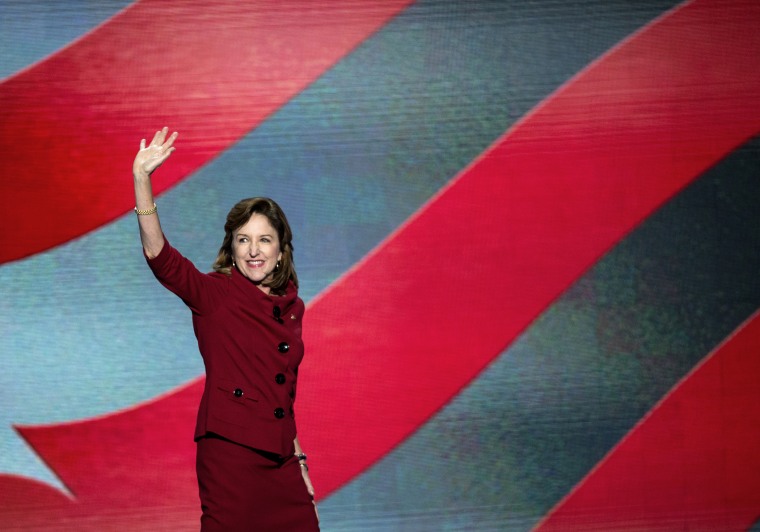There are more women serving in the Senate now than ever before in history.
That's no time to get complacent.
At a gala in midtown Manhattan this week, EMILY's List--a major force in getting pro-choice women into elected office--spelled out its strategy for 2014: go after Republicans on issues like rape and health care.
“What is this, 1953?” Massachusetts Senator Elizabeth Warren asked in a video, after Todd Akin’s now infamous "legitimate rape” comment brought a boo from the crowd.
EMILY’s List President Stephanie Schriock hit the GOP as “a party that doesn’t seem to like women very much,” and is “obsessed with rolling back women’s reproductive rights” and “willing to shut down our government over women’s health care.”
In 2012 the Republicans had their best shot in years at taking the Senate. Focusing on the GOP's "war on women" helped the Democrats survive, and EMILY's List believes the same strategy could help the party pick up seats in the House next year.
"If you look at the House after what’s happened in the last four weeks, this House is in play,” Schriock told msnbc.com. She said they'd be working "to recruit good, strong women to run against Tea Party Republicans."
One strong woman who scarcely needs to be recruited is Hillary Clinton. A giant poster of her beamed above the stage. But right now the group is focusing on 2014, so the panel of Democratic women at the gala spent their time name-checking women candidates for congress and statewide offices.
"The two best opportunities that the Democrats have to pick up seats in the United States Senate are [with] Michelle Nunn in Georgia and Alison Lundergan Grimes in Kentucky," Schriock told msnbc.com.
Recent polling shows that the government shutdown put Republican approval ratings into freefall. Senator John McCain pointed to the adults in the rotunda the day the shutdown lifted: “Leadership, I must fully admit, was provided primarily by women in the Senate,” McCain said.
According to recent numbers from the Democatic-leaning Public Policy Polling, Nunn is tied at 42% with a generic Republican opponent--but her lead jumps to 48-42 when respondents are told her likliest opponents are the trio of Republican congressmen from Georgia who voted for the government shutdown (Paul Broun, Phil Gingrey, and Jack Kingston).
The GOP launched a rebranding effort last summer: Project Grow and “Women on the Right UNITE” formed in late June to attempt close the gender gap. But according to a recent United Technologies/National Journal poll released on Oct. 2, only 14% of women said the Republican party had moved closer to their perspective since the last election; 33% said the GOP was now further from their views. Nearly half saw no change.
That split will factor into races across the country in 2014, including the Pennsylvania gubernatorial contest. Rep. Allyson Schwartz, a five-term Democratic congresswoman--and a 14-year veteran of the top post at a Planned Parenthood-backed health clinic--may face off against Republican incumbent Governor Tom Corbett, who is still under fire for a comment supporting mandatory ultrasounds for women seeking abortions (Corbett said that women who didn’t want to view the images could simply close their eyes). In a Quinnipiac poll conducted last month, Schwartz led Corbett by 13 points. Should Schwartz win her party’s primary and beat Corbett next November, she would be the first female governor of Pennsylvania.
Schwartz told msnbc.com that the decision to jump into the governor's race "was very much about watching Tom Corbett and seeing him make decisions I think were bad for Pennsylvania," including cutting basic education and "making it more expensive rather than more affordable to go to college... driving us to 49th at one point in economic growth in the country... as well as the issue of refusing to take the federal dollars for families to be able to get health insurance."
Of the 36 gubernatorial races to be held in 2014, a handful of female Democratic candidates are expected to win their party's primary and be competitive in the general election. EMILY’s List is backing five, including Schwartz and Texas State Senator Wendy Davis, who rose to prominence overnight with a filibuster protesting a restrictive anti-abortion bill. Massachusetts’ Martha Coakley, Wisconsin’s Mary Burke, and New Jersey’s Barbara Buono are also on the list.
The only Democratic woman governor currently in office, Maggie Hassan of New Hampshire, is likely to win reelection.
With plenty of time left for entry, 2014 could be a banner year for female governors. A record nine held office at the same time, both in 2004 and 2007. According to the Center for American Women in Politics at Rutgers, 27 women have filed for governors’ races nationwide so far, including 4 incumbents, 13 as challengers, and ten in open races. Sixteen are Democrats, and 11 are Republicans.
On the presidential level, Hillary of course looms over everyone, even as the poster of her fluttered above the stage. But Schriock says Clinton isn't the group's only alternative.
"We have some really great women in the pipeline," Schriock told msnbc.com, pointing to New York's Sen. Kirsten Gillibrand and Minnesota Sen. Amy Klobuchar, as well as former DHS Secretary and Arizona Governor Janet Napolitano, and former Governor Christine Gregoire of Washington.
"And that's just for '16 and '20," Schriock said. "If you look at some of the attorneys general across the country--Lisa Madigan in Illinois, Catherine Cortez Masto in Nevada, Kathleen Kane in Pennsylvania--these are the three women we're going to be talking about in the coming years."
At the close of the hour-long discussion, moderator Joanna Coles of Cosmopolitan magazine acknowledged the inevitable question, asking the panelists if they thought Hillary Clinton would run in 2016.
"She knows what she wants and she does it," North Carolina Senator Kay Hagan said, along with her fellow panelists. "Add me to the 'yes' list."
